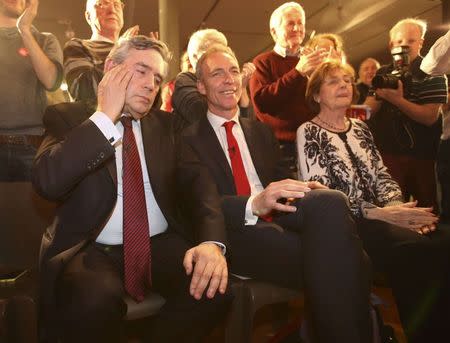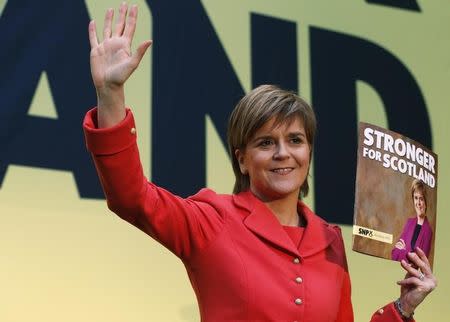In former PM Brown's home town, Scottish Labour Party fights for its life
By Angus MacSwan KIRKCALDY, Scotland (Reuters) - - No election battle more starkly demonstrates the sudden collapse of Britain's Labour Party in Scotland than the one unfolding in the home town of former Prime Minister Gordon Brown, which his party looks set to lose for the first time in 80 years. The fight is not yet over and Labour still hopes to cling to the constituency of Kirkcaldy and Cowdenbeath in Thursday's election. But the latest polls predict victory for the Scottish Nationalist Party (SNP), which lost a referendum on independence last year only to emerge as Scotland's dominant political force. In one of the biggest British political shakeups in decades, the SNP is predicted to win the vast majority of the 59 Scottish seats in the House of Commons, mostly at Labour's expense, to claim the balance of power in a United Kingdom it wants to break up. Here in Kirkcaldy, birthplace of Adam Smith who defined modern economics in “The Wealth of Nations”, and staunchly Labour for generations, the boarded-up shops fronts and down-and-outs on the High Street tell the heart of the story. The city, known as the “Lang Toun” for the way it stretches along the Firth of Forth coast, has lost the linoleum factories which once gave its streets a distinctive smell. The coal mines in the surrounding county of Fife are long since shut. It has one of the highest unemployment rates in Scotland, especially among youths, and what jobs are left are now mostly in the services sector. Two fresh blows landed in recent weeks: the Tesco grocery store shut and the Tullis Russell paper mill went into liquidation. The two accounted for nearly 500 jobs. Locals say they have seen nothing of the economic recovery touted by Conservative Prime Minister David Cameron, and many no longer trust any London-based party, including Labour, to deliver better. “Just look at the state of the High Street,” said David Cruickshanks, an ex-Royal Navy sailor sitting in Kendo’s coffee shop. “We haven’t had any good jobs here for a while.” Cruickshanks said he would vote SNP. The SNP says it will vote to push Cameron out of power and keep a minority Labour government committed to social justice. Labour says the only way to kick out the Conservatives is to elect Labour candidates. It is hoping that message will help it defy the doomsday predictions of pollsters in Scotland, and is also relying on the personal appeal of its incumbent candidates, often well liked even by constituents who berate the party. INSTRUMENT FOR SOCIAL JUSTICE In Kirkcaldy the incumbent is not running again. Brown, Tony Blair's Chancellor for 11 years and prime minister on his own for two, is retiring from politics at Thursday's election after staying on to represent his home town in parliament despite losing the premiership in 2010. A fearsome orator who helped deliver a victory for the campaign to keep Scotland in the United Kingdom with impassioned speeches in the final hour last year, Brown appears to be relishing one final fight for his party. "I come here not as a candidate, but proud to be a volunteer," he said in a speech on Tuesday in Glasgow. "We will prove in government again that the Labour Party is the greatest instrument for social justice that this country has ever created." Brown, born near Glasgow and raised in Kirkcaldy where his father was a church minister, has thrown his prestige behind Labour's candidate for his seat, 33-year-old local councillor Kenny Selbie. But even for such a powerful figure as Brown, with such deep local roots, passing the torch has not been easy. “It’s hard work. There’s no two ways about it,” Selbie told Reuters at his headquarters on Tuesday just before setting out for another day campaigning. “It’s also clear that the SNP are targeting this constituency with huge resources.” Despite losing the prime ministership, Brown held on to his seat in the 2010 election with more than 50 percent of the turnout. But a poll by Conservative pollster Michael Ashcroft in February found a 28.5% swing towards the SNP. On a “dreich day” - overcast and rainy - the SNP headquarters in a yellow-bedecked shop front on the High Street seemed to radiate optimism. SNP candidate Roger Mullin oozed confidence but told Reuters that victory was by no means certain. Polls could be misleading. “We’ve talked on the doorstep alone to 25 per cent of voters, let alone other forms of engagement. Our membership goes up every day.” The SNP's message has reached Scots, who tend to lean left even across social classes. Corporate lawyer Ian Taylor, walking down the street to the barber shop, said he became disillusioned with Labour under Blair, especially over the Iraq War. “What they are offering is a more progressive way of approaching politics,” he said of the SNP. He also credited Nicola Sturgeon, the SNP leader, with winning people over. While the issue of Scotland’s independence is not on Thursday's ballot, last year's referendum - in which 55 percent of Scots voted to stay in the United Kingdom - still lingers in the air. Though most rejected independence, many Scots were alienated by the sight of Britain’s main political parties closing ranks around the union. “A large number of Labour supporters voted 'Yes' in the referendum then found themselves vilified by their leaders. They’ve begun to see things in a different light,” said the SNP’s Mullin. “We’ve also picked up people who voted 'No' but do want to see more powers for Scotland.” As a leading voice against independence, Brown joined other UK politicians in promising that Scotland would swiftly be given more powers over its own affairs. Many Scots say that pledge has gone unfulfilled and all the UK-wide parties are to blame, with Labour guiltier than the others for the perceived betrayal of one of its own heartlands. Still, in Kendo’s coffee shop, there were still votes left to win with just two days to go. “That Nigel Farage has some good ideas. He’s got some bad ones too,” said business owner Alex Dougan of the leader of the anti-EU United Kingdom Independence Party, not a big force in Scotland. “If it’s the SNP, that Sturgeon will be going on about ‘give us independence’ forever,” he said. “I’ve always voted Labour but this time I won’t know until I get there." (Reporting by Angus MacSwan; Additional reporting by Alistair Smout in Glasgow; Editing by Peter Graff)

 Yahoo News
Yahoo News 


